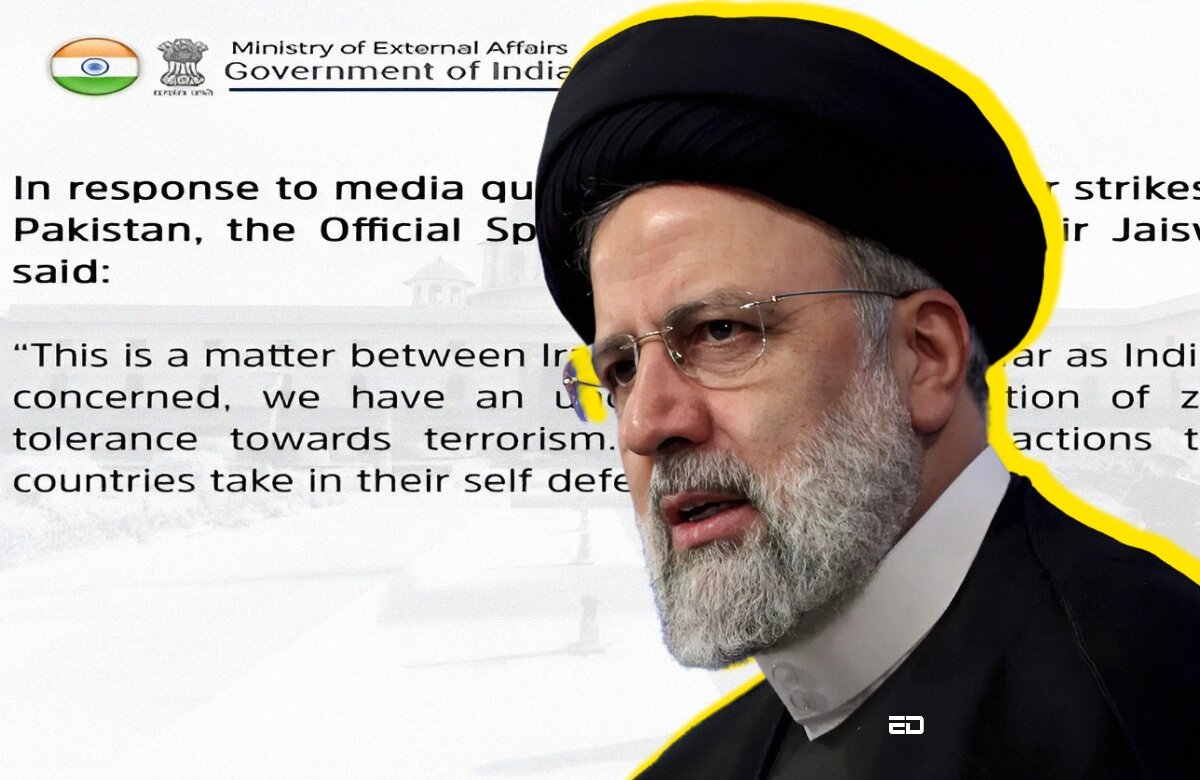In a recent escalation of tensions in West Asia, Iran conducted missile strikes on bases of the militant group Jaish-al-Adl in Pakistan, leading to a series of retaliatory actions between the two nations. The situation took an unexpected turn as India, historically tied to both Iran and Pakistan, responded in a manner that raised eyebrows.
India’s Ministry of External Affairs has adopted a nuanced stance, seemingly offering justification for Iran’s recent attacks on Pakistani soil. The official statement underscores India’s comprehension of actions taken by nations in self-defense, drawing a parallel with its own historical context of cross-border operations.
By acknowledging the legitimacy of such defensive measures, India implies a recognition of the complex security challenges faced by countries in the region. This diplomatic alignment and endorsement of Iran’s actions against Jaish-al-Adl reflects a strategic approach that resonates with India’s own experiences in combating terrorism, particularly through surgical strikes in 2016 and airstrikes in 2019 on terror camps situated in Pakistan.
India’s Justification Of Iran’s Strikes In Pakistan
The rationale behind India’s stance appears rooted in the belief that nations have the inherent right to protect their sovereignty and citizens from external threats. By invoking its own history of counterterrorism operations, India aims to signal an understanding of the difficult choices countries make in addressing security concerns. This diplomatic positioning not only strengthens India’s ties with Iran but also reinforces a broader narrative that emphasizes shared challenges in the fight against terrorism, positioning both nations as responsible actors in safeguarding regional stability.
Also Read: ResearchED: How Two Years Of Taliban Rule Impacted Women, Economy, And Geopolitics
In 2016, the Indian Army executed surgical strikes against terrorist camps situated in Pakistan-occupied Kashmir. This response came in the aftermath of a deadly attack on an Indian army base in Kashmir. Subsequently, in 2019, the Indian Air Force conducted airstrikes in Balakot, targeting the Jaish-e-Mohammed terror camp, following a suicide bombing in Kashmir. These operations were emblematic of India’s proactive stance in addressing threats emanating from across its borders.
The significance of these military actions lies not only in their tactical success but also in shaping India’s broader perspective on counterterrorism. The surgical strikes and airstrikes underscore India’s commitment to preemptive measures and the use of force when faced with imminent security threats. This historical context illuminates the rationale behind India’s understanding and endorsement of Iran’s recent actions, as both nations grapple with the complex challenge of ensuring regional security and stability in the face of terrorist activities.
India-Iran Relations
India’s stance on Iran’s recent actions not only reflects a diplomatic tightrope but also underscores the endurance of a longstanding and generally amicable relationship between the two nations. Despite intermittent challenges, the countries have maintained a history of peaceful ties.
Issues such as India’s decision to halt oil imports from Iran due to U.S. sanctions and divergent geopolitical alliances, including India’s close ties with Israel and Iran’s connections with China, have presented testing moments. Nevertheless, both nations have consistently striven to uphold cordial relations, acknowledging the importance of their historical and diplomatic ties.
Geopolitically, India’s response to Iran’s actions is shaped by its strategic interests in West Asia. The region holds considerable significance for India, and the maintenance of robust ties with Iran becomes pivotal in counterbalancing China’s expanding influence.
In navigating the complex dynamics of West Asia, India recognizes the necessity of engaging with Iran diplomatically to secure its standing in the Arab world. This diplomatic dance is aptly summarized by External Affairs Minister S Jaishankar, who highlighted the nuanced approach required in managing relationships with multiple nations, stating, “Foreign policy is about interests. It’s about leverage. It’s about priorities. It’s about sequencing.”
Maritime Concerns: Shared Challenges And Diplomacy
Maritime concerns further complicate the intricate equation. Recent attacks by Iran-backed Houthi rebels on maritime vessels, including those affecting India’s exports, have added a layer of complexity to India’s diplomatic considerations. In discussions with Iranian counterparts, Jaishankar emphasized the shared economic interests at stake, stating, “There has also recently been a perceptible increase in threats to the safety of maritime commercial traffic in this important part of the Indian Ocean.” India seeks Iran’s cooperation in urging Houthi rebels to cease their attacks, illustrating the collaborative approach both nations adopt to address shared challenges.
In the broader context of India-Iran relations, External Affairs Minister Jaishankar’s recent remarks during his visit to Tehran capture the essence of India’s diplomatic efforts. He acknowledged the importance of maintaining stability and addressing threats in the region, stating, “This fraught situation is not to the benefit of any party.”
India’s engagement with Iran is multifaceted, encompassing economic, strategic, and security considerations. As both nations navigate this intricate diplomatic terrain, the shared understanding of challenges and the pursuit of mutually beneficial solutions form the basis for a resilient and forward-looking relationship.
As India navigates the intricate dynamics between Iran and Pakistan, its diplomatic stance reflects a calculated gamble. By justifying Iran’s actions, India positions itself within the context of its own counterterrorism history, delicate bilateral relations, and broader geopolitical considerations. Whether this diplomatic gamble pays off remains uncertain, but it underscores India’s strategic calculus in a region marred by escalating tensions.
Image Credits: Google Images
Feature image designed by Saudamini Seth
Sources: First Post, Economic Times, The Hindu
Find the blogger: Katyayani Joshi
This post is tagged under: Iran, Pakistan, India, Iran-Pakistan conflict, Jaish- Al- Adl, terrorism, air strikes, surgical strike, Houthis, conflict, strike back, counterterrorism
Disclaimer: We do not hold any right, copyright over any of the images used, these have been taken from Google. In case of credits or removal, the owner may kindly mail us.
Other Recommendations:
Demystifier: What Is Chaddi War & Chaddi Politics?
